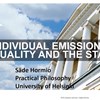budge
Completed: Foundations of Behavioral Economics and the Nudge Agenda
This project will examine what behavioral economics and the nudge agenda are, to get a better understanding of contemporary economics and where it is heading.
Lukas H. Meyer: Fairness is most relevant for country shares of the remaining carbon budget
Lukas H. Meyer, Professor of Philosophy at the University of Graz, Austria, and Speaker of the Field of Excellence Climate Change Graz, the Doctoral Programme Climate Change, and the Working Unit MoraIn my talk I argue that fairness concerns are decisive for eventual cumulative emission allocations shown in terms of quantified national shares.I will show that major fairness concerns are quantitatively critical for the allocation of the global carbon budget across countries. The budget is limited by the aim of staying well below 2°C. Minimal fairness requirements include securing basic needs, attributing historical responsibility for past emissions, accounting for benefits from past emissions, and not exceeding countries’ societally feasible emission reduction rate. The argument in favor of taking into account these fairness concerns reflects a critique of both simple equality and staged approaches, the former demanding the equal-per-capita distribution from now on, the latter preserving the inequality of the status-quo levels of emissions for the transformation period. I argue that the overall most plausible approach is a four-fold qualified version of the equal-per-capita view that incorporates the legitimate reasons for grandfathering.
Conference: Philosophical Perspectives on Social Injustice
Location: Institute for Futures Studies, Holländargatan 13 in Stockholm If you plan to attend all or parts of the conference, please register by sending an e-mail to [email protected] Thursday Decem
Erik Angner: Nudging as Design
Erik Angner, Professor of Practical Philosophy Abstract The nudge agenda due to Richard Thaler and Cass Sunstein has proven polarizing. To advocates, nudging allows us to improve people’s choices and th

Julia Adler
I am a research assistant at the Mimir Center for Longterm Futures Research. In my role as research assistant I support the research group with planning, administration and implementation of the projec I am also writing my master's thesis in political science at Stockholm University as part of this project. I also support the communications department.
Climate change: Life and death
John Broome, White's Professor of Moral Philosophy The international community has agreed on the aim of avoiding dangerous interference with the climate system. Determining what level of interference i

Säde Hormio: Individual emissions, equality and the state
Seminar with Säde Hormio, researcher in Practical Philosophy at the University of Helsinki. ABSTRACT The amount of greenhouse gases that can still be emitted to the atmosphere is very limited if global
Moderators of the disapproval of peer punishment
Group Processes & Intergroup Relations, 1368430215583519. Abstract Recent studies have found disapproval of peer punishment of norm violations. This seems puzzling, given the potential benefits peer

A conversation with Lea Ypi: Indignity - A Life Reimagined
We welcome back Lea Ypi, professor and award-winning author of the book Free: Coming of Age at the End of History. Now she returns to present her new book, Indignity: A Life Reimagined. In this work,
Completed: Agenta
Ageing Europe: An application of National Transfer Accounts (NTA) for explaining and projecting trends in public finances (AGENTA). The AGENTA project aims at explaining the past and forecasting the fu








